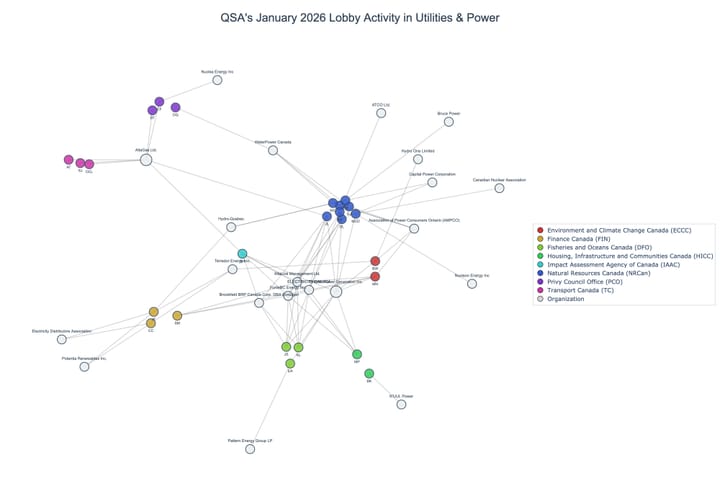QSA's Week in Utilities & Power (#43, 2025)
G7 ministers advance energy security, AI work plan; Canada invests in carbon tech and energy AI; US DOE expands loan guarantee eligibility; EPA seeks input on air emissions rules; Ontario launches hydrogen fund

Good morning! This is Queen Street Analytics' weekly roundup of regulatory developments, legislative discussions, political announcements, and other government-related news concerning power generation and transmission, wind and solar, utilities, midstream companies, batteries and energy storage, LNG, biofuels and nuclear. Every Monday, we break down the most important updates in this space in under five minutes.
Want to track other GR news in adjacent industries? Don’t miss this week’s updates in Oil & Gas and Construction.
Dates: 2025-10-26 to 2025-11-01
📋 In This Week's Newsletter
• 🏛️ This Week's Parliamentary Committee Calendar
• 🇨🇦 Canadian Federal GR News
• 🇺🇸 US Federal GR News
• 🗺️ Canadian Provincial GR News
• 📚 What We're Reading This Week
This Week's Parliamentary Committee Calendar
- House ENVI Committee - Study on Electric Vehicle Availability Standard (November 3, 2025): Committee on Environment and Sustainable Development hears from Environment Canada Assistant Deputy Minister Megan Nichols and Mark Cauchi on the federal Electric Vehicle Availability Standard.
- House ENVI Committee - Continued Hearings on Electric Vehicle Standards (November 6, 2025): Panel to include Clean Energy Canada, Electric Mobility Canada, vehicle dealers, and industry representatives.
- Senate ENEV Committee - Examination of Newfoundland and Labrador Offshore Petroleum Industry (November 4, 2025): Senate Energy, Environment and Natural Resources Committee to hear from Professor Brian Veitch of Memorial University regarding Newfoundland and Labrador’s offshore petroleum sector.
- Senate ENEV Committee - Further Consideration of Offshore Petroleum Industry (November 6, 2025): Senate committee keeps Newfoundland and Labrador offshore petroleum industry under review.
- Senate POFO Committee - Report on Ocean Carbon Sequestration (November 4, 2025): Senate Fisheries and Oceans Committee to examine and report on ocean carbon sequestration use in Canada.
Canadian Federal GR News
G7 Energy and Environment Ministers Issue Joint Calls to Strengthen Energy Security and Grid Resilience
G7 Energy and Environment Ministers, meeting in Toronto, advanced a Call to Action on Enhancing Energy Security, with a focus on securing energy sources and critical mineral supply chains. Key items included the launch of the Critical Minerals Production Alliance, commitments to accelerate the permitting and deployment of grid infrastructure, and initiatives to address grid resilience and transmission. Ministers acknowledged the risks from concentrated supply chains, aging infrastructure, and extreme weather events. Canada signed separate agreements to advance critical minerals cooperation with Italy and Australia, and confirmed work with the EU and Japan on secure energy supply chains. A portion of Canada’s $70-million commitment to Ukraine's Energy Support Fund was expedited, with $10 million released to support Ukrainian power infrastructure.
Sources: Announcements: www.canada.ca, Announcements: www.canada.ca, Announcements: www.canada.ca, Announcements: www.canada.ca

Canada Moves Forward on Artificial Intelligence Deployment for Energy Sector
At the G7 Energy and Environment Ministers’ Meeting, Canada agreed to a multi-country Energy and Artificial Intelligence Work Plan, aiming to power AI data centres with reliable and affordable energy, and to mitigate the impact of AI on grid demand. Ministers agreed to collaborate on secure energy supply to data centres, support grid expansion, and promote AI use in optimizing energy demand, with cost-effective solutions tailored to national priorities. Canada launched a $10-million AI for Canadian Energy Innovation funding call for high-impact RD&D projects accelerating AI solutions for energy operations. Industry and research partners will share non-commercially sensitive data to build trust in AI adoption, with efforts to catalogue best practices and enable workforce re-skilling for AI-augmented utility operations.
Sources: Announcements: www.canada.ca, Announcements: www.canada.ca, Announcements: www.canada.ca
Federal Investments in Carbon Capture, Storage, and Utilization Technologies Announced
Natural Resources Canada announced over $11 million in funding for four Carbon Capture, Utilization, and Storage (CCUS) projects. Memorial University of Newfoundland will evaluate carbon storage in Atlantic Canada with a $5-million allocation. INRS in Quebec will prepare geological storage pilots, including digital reservoir modeling. Canadian Discovery Ltd. will produce a geological CO2 storage atlas for Eastern Canada, focusing on saline aquifers and depleted hydrocarbon pools for public and industry use. Université Laval will test carbon mineralization processes for the dual purpose of CO2 sequestration and critical metals recovery. These projects combine economic and life-cycle assessment, regional mapping, regulatory framework development, and technology trials for industrial adoption.
Sources: Announcements: www.canada.ca
Committee Reviews 2030 Emissions Reduction Plans With Industry, Academic, and Indigenous Stakeholders
The Standing Committee on Environment and Sustainable Development (ENVI) held hearings on Canada's 2030 emissions reduction plan. Stakeholders, including Clean Prosperity and the Pembina Institute, called for clear and robust industrial carbon pricing to achieve sectoral emissions cuts, noting differing progress across electricity and oil and gas industries. Agricultural representatives cited concerns regarding the carbon tax's impact on farming operations and fertilizer targets. The National Coalition of Chiefs and other witnesses critiqued emissions cap proposals, and the need for Indigenous-led resource development was raised. Testimony included calls for sector-specific decarbonization pathways and investment in clean technology, as well as practical accommodation for rural and farm-specific electrification limitations. Committee members discussed collaboration between federal and provincial governments to balance emissions goals with economic growth and industrial competitiveness.
Sources: parlvu.parl.gc.ca
Parliamentary Study on Energy Infrastructure Cybersecurity Provisions Moves Forward Under Bill C-8
The Public Safety and National Security Committee (SECU) examined Bill C-8, which amends the Telecommunications Act with measures to enhance cybersecurity for critical infrastructure. The Canadian Centre for Cyber Security outlined new incident reporting duties for infrastructure operators, designed to improve threat detection and response in close coordination with industry. Powers to compel telecoms to cease operations in emergencies, subject to safeguards and oversight, were discussed. Protections for private and proprietary information are to be implemented alongside administrative monetary penalties for non-compliance. Industry representatives and MPs addressed legal and financial impacts, requirements for judicial processes, and information-sharing mechanisms with provinces. The legislation focuses on protecting national infrastructure, with carve-outs on jurisdiction and limitations regarding encryption mandates.
Sources: parlvu.parl.gc.ca
House Committee Studies Canada's Innovation Gaps in Commercialization and R&D Investment
At the House Standing Committee on Science and Research (SRSR), experts from research institutions and tech industries addressed Canada's lagging business R&D investment compared to international peers. Recommendations included legislative protection of data sovereignty and establishment of a sovereign innovation fund. Executives from the MaRS Discovery District and U15 Canada cited the lack of scaling opportunities and commercial investments, resulting in GDP losses. A gap in research funding distribution between universities and applied colleges was raised, prompting discussion of targeted funding and support mechanisms to link discovery with industry deployment. The committee considered proposals for public grants, tax incentives, and competition frameworks to spur domestic innovation and technological adoption in energy and manufacturing sectors.
Sources: parlvu.parl.gc.ca
Canadian Legislature Examines Ocean Carbon Sequestration Research Frameworks
The Senate Committee on Fisheries and Oceans reviewed marine carbon dioxide removal (mCDR) as a carbon sequestration strategy. Witnesses from the Ocean Frontier Institute and GEOMAR outlined Canada's capacity for marine-based carbon removal owing to its three-ocean geography. They referenced a need for consistent monitoring standards and innovation testbeds, noting the critical role of science-based verification (MRV) for scalable deployment. International collaboration and social license were flagged as integral to framework development. The discussion included the legal and policy context for ocean-based research, including implications of potential resolutions at the London Protocol.
Sources: senparlvu.parl.gc.ca
StatsCan Reports 2024 Electric Power and Manufacturing Energy Consumption Trends
Statistics Canada released new datasets on the state of electric power generation and energy consumption. For 2024, primary energy production increased by 2.9% to 2.1 million terajoules, while manufacturing energy consumption fell by 2.3% to 2,090 petajoules, continuing a multi-year downward trend. Secondary energy production levels edged slightly downward. The inventory provides data essential for power producers and regulators to assess shifts in generation profiles, sectoral energy use, and strategic planning for power demand.
Sources: Open Government Data Set: www.statcan.gc.ca, Open Government Data Set: www.statcan.gc.ca, Open Government Data Set: www.statcan.gc.ca
Natural Resources Committee Reviews Federal Support for Forestry Sector Facing US Tariffs
The House Standing Committee on Natural Resources (RNNR) heard from Natural Resources Canada officials on the $30-billion GDP forestry sector’s challenges. US softwood lumber tariffs and market restrictions have reduced liquidity and led to closures, with $1.25 billion in federal support including $700 million in loan guarantees and $500 million for sector transformation. The committee considered progress on the 2 Billion Trees Program, market diversification, innovation in bioenergy and engineered wood, and efforts to standardize building codes for advanced wood products. The adequacy of federal assistance and the need for longer-term solutions for competitiveness and job protection were recurring themes.
Sources: parlvu.parl.gc.ca
CUSMA Scrutiny Intensifies: Trade, Forestry, and LNG Sectors Address Tariff and Market Risks
At the House Committee on International Trade (CIIT), sector representatives pressed for robust inclusion of forestry in CUSMA (Canada-United States-Mexico Agreement) renegotiations, citing prior mill closures and employment losses. Export Development Canada highlighted diversification needs amid US trade uncertainty, outlining a $5-billion Trade Impact Program for SMEs and support for LNG in Asian and European markets. Quebec manufacturers called for federal policies to adapt to trade disruptions and highlighted workforce needs. The committee reviewed potential approaches for protecting key industries, forest manufacturing tax credits, adaptable federal supports, and market promotion of Canadian products to US stakeholders.
Sources: parlvu.parl.gc.ca
US Federal GR News
US Department of Energy Expands Loan Guarantee Program Under 'Energy Dominance Financing' Amendments
The Department of Energy published interim amendments to its loan guarantee regulations, expanding Section 1706 eligibility to a broader range of energy infrastructure projects as authorized by the One Big Beautiful Bill Act. The rule eliminates requirements for projects to demonstrate emissions reductions and now allows projects that increase capacity, output, or provide grid support. The total principal ceiling was raised to $250 billion through 2028. The rule also ends the application mandate for analysis of impacts on associated communities, reducing administrative requirements for applicants.
Sources: www.federalregister.gov
EPA Seeks Public Input on National Air Emissions Reporting Requirements (AERR) Renewal
The Environmental Protection Agency submitted an information collection renewal for the Air Emissions Reporting Requirements to the OMB. The renewal affects 54 state and territorial air quality agencies, 9 local agencies, and voluntary tribal participants, now including 12,379 owner/operator respondents. The reporting supports the comprehensive national air pollutant emissions inventory, used to fulfill EPA and state obligations for NAAQS (National Ambient Air Quality Standards) implementation. Recent methodology improvements and the inclusion of owner/operator burdens increased the annual reporting burden and costs.
Sources: Uwww.federalregister.gov
EPA Renews Reporting Provisions for Renewable Fuel Standard (RFS) Annual Rules
EPA requested OMB approval for continued information collection under the Renewable Fuel Standard (RFS) program. The renewal covers updated recordkeeping and reporting for biointermediate producers and renewable fuel providers, tied to EPA's implementation of RFS annual rules. Lower than anticipated participation in the biointermediate pathway contributed to a decrease in estimated annual reporting burdens.
Sources: www.federalregister.gov
PHMSA Seeks Public Comment on Kinder Morgan/Southern Natural Gas Pipeline Safety Permit Extension
The Pipeline and Hazardous Materials Safety Administration (PHMSA) issued a notice for public comment on Southern Natural Gas Company’s request to extend a special permit for a segment of its transmission pipeline system in Georgia. The permit would maintain regulatory relief related to safety requirements for class location changes. Interested parties have until December 1, 2025, to submit comments before PHMSA finalizes its decision.
Sources: www.federalregister.gov
Canadian Provincial GR News
Ontario Expands Hydrogen Innovation Fund to $30 Million
Ontario is doubling its Hydrogen Innovation Fund to $30 million, broadening project eligibility to encompass grid integration and cross-sector applications including transportation, industrial processing, and hydrogen hub formation. The expanded fund supports the province's integrated energy plan and energy sector resilience.
Sources: news.ontario.ca
Ontario Panel to Address Electricity Distribution System Financing and Customer Service Standards
The government of Ontario established the Panel for Utility Leadership and Service Excellence (PULSE) to recommend regulatory and funding frameworks for local electricity distribution companies, addressing infrastructure modernization, investment models, and disparities in service standards. The panel aims to deliver recommendations on utility transformation and ratepayer impacts by early 2026.
Sources: news.ontario.ca, news.ontario.ca
Ontario, New Brunswick Finalize Agreement on Nuclear Power Support Services
Ontario and New Brunswick signed a three-year $60-million agreement for Laurentis Energy Partners to provide New Brunswick Power with benchmarking and operational support targeting performance at the Point Lepreau Nuclear Generating Station. The agreement covers structured oversight, on-site services, and personnel development.
Sources: news.ontario.ca
Ontario Initiates Feasibility Study for New East-West Energy Corridor
Ontario awarded a contract for a study evaluating a new, Canadian East-West pipeline and energy corridor. The scope includes analysis of oil, gas, and complementary infrastructure, and assesses routes, costs, and integration potential with regional resource and grid upgrade priorities.
Sources: news.ontario.ca
Saskatchewan Government Backs New Clean Energy Research Partnership
Saskatchewan is providing $780,000 to establish the Global Institute for Energy, Minerals and Society (GIEMS), a collaboration among Saskatchewan Polytechnic, the University of Regina, and the University of Saskatchewan, focused on energy and mineral sector research, training, and innovation.
Sources: www.saskatchewan.ca
What We're Reading This Week
- P.E.I. releases new 10-year energy strategy aimed at making Island's power grid stronger: The province introduces a decade-long plan to fortify its electricity system.
- Ontario launches study on viability of East-West pipeline, energy corridor: Ontario embarks on a feasibility study for a new interprovincial pipeline and corridor project.
- Ahead of G7 meetings, energy minister announces funding for green tech projects: Preceding the G7 summit, Canada commits to investment in low-carbon and grid tech.
- NMG and Panasonic Energy Update Their Commercial Agreement; Plan to Launch a Dedicated Initial Capacity of Active Anode Material Production: NMG and Panasonic advance a commercial agreement for anode material production in Canada.
- dynaCERT Presents HydraGEN™ at International Logistics Trade Fairs: Focus on Sustainable Supply Chains and Low-Emission Port Logistics: dynaCERT showcases emission reduction technology for maritime and port operations.
- Anaergia S.r.l. in Joint Venture to Supply C$22 Million Technology Package to Ora Biogas Project in Basilicata, Italy: Anaergia enters joint venture to provide technology for a biogas facility in Italy.
- Smackover Lithium Receives Key Final Integration Approval from the Arkansas Oil and Gas Commission for South West Arkansas Project: Smackover Lithium achieves permitting milestone toward US lithium production.
- Premier Houston heads to Alberta, Texas in first trip as energy minister: Nova Scotia’s premier travels to discuss clean energy development opportunities.
- Max Power Set to Advance Next-Generation Earth Model to Define the Cutting Edge for Natural Hydrogen Exploration: Max Power develops geoscience models for hydrogen prospecting.
- United States Government, Brookfield and Cameco Announce Transformational Partnership to Deliver Long-term Value Using Westinghouse Nuclear Reactor Technology: A new US-CAN partnership set to leverage Westinghouse nuclear technology.


